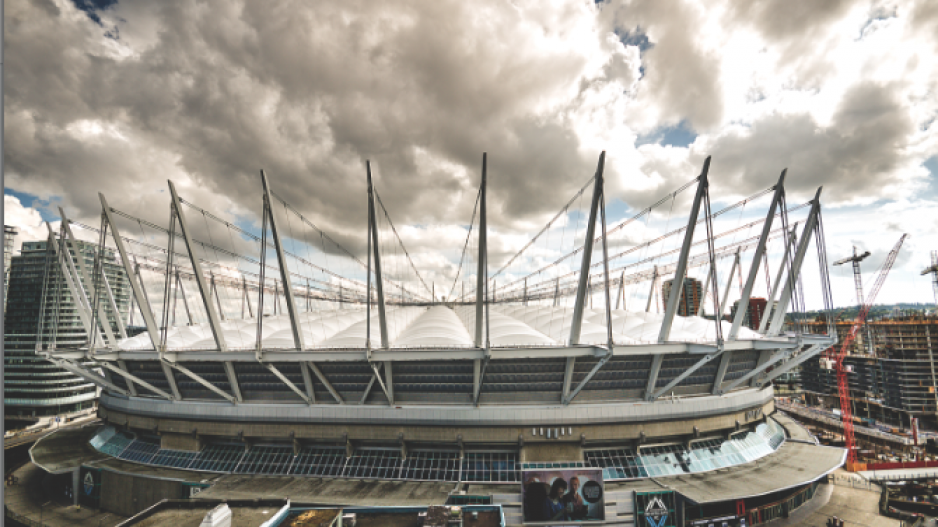Sixteen years after B.C. Place Stadium’s original inflated fabric roof ripped and collapsed, how is the 2011-opened retractable system faring?
A report obtained from B.C. Pavilion Corporation (PavCo) via freedom of information about the spring 2022 inspection found no major concerns. But inspectors did recommended keeping the roof tidier.
“Apart from the wear of the fabric due to folding, the fabric and the belts are in good condition,” said the results of the March 28-April 1, 2022 inspection by Pfeifer Structures, which merged with original installer FabriTec in 2014.
“No significant damage was found, several but not all minor damages were patched. The drive system of the roof and the hydraulic system of the garage worked without any failure and with only minor errors prior to the inspection, but could be fixed during the maintenance.”
The list of 17 recommendations for minor work highlighted the need for regular cleaning where the fabric is in contact with other parts of the structure, and to stay ahead of curious seagulls and crows.
“The roof should further be cleaned from the inner filling dripping from the upper radial cables. As far as we know, the inner filling does not compromise the integrity of the fabric, but long- term impacts have not been investigated,” the report said. “To prevent the birds from causing damage by further pulling yarns from the edge of fabric seams on the roof, the yarns should be cut on a regular basis. It is recommended using kids scissors with blunt-tip blades to avoid accidental damage to the fabric.”
PavCo spokesperson Meaghan Benmore said all but three of recommendations have been completed.
“All repairs and updates will be completed ahead of our spring 2023 inspection and the costs are incorporated in our ongoing maintenance costs,” she said.
Three months after the inspection report, a malfunction kept the roof closed for two events during some of the hottest days of the summer of 2022: a July 21 B.C. Lions game and a July 23 Vancouver Whitecaps game. Two sources said that the malfunction happened after workers had been spraying water on the roof.
PavCo’s FOI office said that neither an incident report nor a work order was created. Work to reopen the roof was conducted via video chat and remote access with Pfeifer, which sent a representative from Europe.
“It was a mechanical failure that posed no danger to the roof or building,” said the PavCo response.
PavCo also said at the end of October that there was no repair or maintenance log for the retractable roof since January 2020.
The roof was built atop the 1983-opened stadium as part of a $514 million project. Major works closed the stadium from May 2010 to September 2011.
The roof replacement was triggered by the Jan. 5, 2007 rip-and-collapse of the original air-supported roof. On that day, snow had been allowed to accumulate, the air temperature fluctuated and five snow alarms were ignored. Instead of activating the snow-melting system, a control room worker spiked the interior air pressure. That caused a mini-avalanche of snow, ice and slush that sliced a gash in the fabric roof.
After the roof was repaired and reinflated, architects and engineers studied whether to replace it before the 2010 Winter Olympics. They concluded it was too complex to guarantee completion before the opening ceremony.
PavCo had already been pondering the future of B.C. Place. A heavily censored June 20, 2006 “Infrastructure Improvements” report, released under FOI, said the stadium had “worn out assets which are critical to basic tenant operations” and improvements were required to “bring it up to standards expected by clients and spectators at events.”
Last June, B.C. Place was named one of 16 venues for the 2026 FIFA World Cup.
According to PavCo financials through March 31, 2022, it owed $128.9 million under a loan agreement with the provincial government. “The current repayment schedule reflects loan payments by PavCo of $7.33 million for fiscal years 2022 through 2048 and $3.7 million for fiscal year 2049,” said the annual financial report.
The latest assessment pegs the stadium at $222.9 million, of which $55.42 million is the land. By comparison, the neighbouring Parq casino and hotel complex is valued at $316.78 million, including $142.98 million land.




